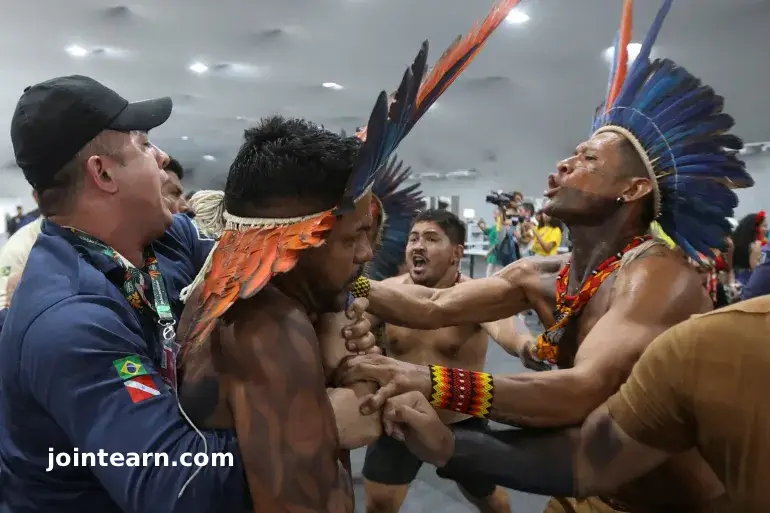
Hundreds of Indigenous activists stormed the UN Climate Change Conference (COP30) in Belem, Brazil, on November 11, 2025, demanding urgent action to protect their lands and the world’s largest rainforest. The protest underscores growing frustration with both the Brazilian government and global leaders over environmental degradation in the Amazon.
Protest Highlights Indigenous Voices
Dozens of protesters forced their way into the COP30 venue after participating in a march to the conference center. Gilmar, an Indigenous leader from the Tupinamba community along the Tapajos River, told reporters:
“We can’t eat money. We want our lands free from agribusiness, oil exploration, illegal miners, and illegal loggers.”
A UN spokesperson confirmed that the protest caused minor injuries to two security staff and some damage to the venue.
Lula Highlights Indigenous Leadership
Brazilian President Luiz Inácio Lula da Silva has emphasized the importance of Indigenous communities in COP30 negotiations, stating that participants should be “inspired by Indigenous peoples and traditional communities – for whom sustainability has always been synonymous with their way of life.”
However, Indigenous groups argue that Brazil’s government has not done enough to prevent illegal logging, mining, and oil exploitation on their territories, especially as Petrobras recently received a license for offshore oil drilling near the Amazon River’s mouth.
Yaku Mama Flotilla Sails to COP30
One of the protest organizers, Leo Cerda, led the Yaku Mama flotilla, a 3,000km (1,864 miles) journey down the Amazon River to reach the summit. Cerda emphasized that Indigenous peoples are defending nature for the survival of all humanity, noting the continued presence of fossil fuel lobbyists at COP meetings.
“Most states want our resources, but they don’t want to guarantee the rights of Indigenous peoples,” Cerda said.
Over the past four years, more than 5,350 fossil fuel lobbyists have participated in UN climate summits, according to The Guardian.
Global Context and Legal Pressure
Representatives from 195 countries are attending COP30, though the United States is notably absent. Under former President Donald Trump, the US has resisted climate action, including blocking negotiations on shipping industry emissions, highlighting ongoing global challenges in reducing greenhouse gases.
This COP30 is also the first since the International Court of Justice (ICJ) ruled that countries failing to meet their climate obligations could be violating international law, increasing legal pressure on nations to act decisively.
The Amazon’s Role in Climate Mitigation
Indigenous groups emphasized the Amazon as a critical carbon sink, absorbing approximately 340 million tons of CO₂, making it one of the most effective strategies for climate mitigation and adaptation. They have called for strong legal protections for Indigenous lands in the Amazon, Congo, and Southeast Asia, to prevent further environmental destruction.


Leave a Reply